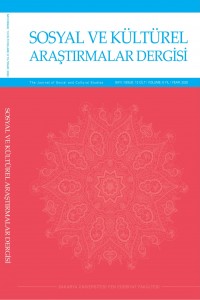Öz
Bu makalede çağdaş bir sosyolog ve düşünür olan Zygmunt Bauman’ın modern ve postmodern etiği nasıl bir perspektiften ele aldığı ve sorunsallaştırdığı incelenmektedir. Bauman modernite ve postmodernite arasında kendisini postmoderniteye daha yakın görmekte ve konumlandırmaktadır. Bu çerçevede onun etik ve ahlak anlayışı da bütünüyle olmasa da postmodern bir özellik göstermektedir. Özellikle aydınlanma felsefesiyle birlikte ahlakın tamamen rasyonelleştirilerek evrensel bir etik koda ve ardından da yasaya dönüştürüldüğünü ve böylece insanın ahlaki kapasitesine el konulduğunu ileri sürer. Modern türdeş toplum, devlet ve bürokratik anlayışın, toplumsal normlara, yasaya ve verilen emre itaate zorlayan yapısının insanı gayri ahlaki ve sorumsuz kıldığını vurgular. Bu bağlamda Bauman bu modern etik anlayışa karşı postmodern etiği önererek, insanın el konulmuş olan ahlaki kapasitesinin geri alınabileceğini ve böylece yaşamın yeniden ahlakileştirilebileceğini düşünür. Dolayısıyla modern etiğin üzerine kurulduğu temele yıkıcı bir darbe vurma girişiminde bulunur. Ancak Bauman’ın perspektifinde postmodern etik nihilist değildir, fakat modern kodlarla da asla uyuşmaz. Kısacası ona göre ahlak dış-erksel değil öz-erkseldir. Dolayısıyla o ahlakın bir tercih meselesi olduğunu ve tercihin olmadığı yerde ahlaktan da bahsedilemeyeceğini vurgular.
Anahtar Kelimeler
Kaynakça
- BAŞOK DİŞ, Sebile (2018). Bauman’ın Modern Etik Eleştirileri Bağlamında Ahlâkîliğin Müphemliğine İlişkin Görüşleri, Kutadgubilig Felsefe-Bilim Araştırmaları, Sayı 37,s.173-191.
- BAUMAN, Zygmunt (1997). Modernite ve Holocaust, (Çev. S. Sertabiboğlu), İstanbul: Sarmal Yayınevi.
- BAUMAN, Zygmunt (2003a). Modernlik ve Müphemlik, (Çev. İ. Türkmen), İstanbul: Ayrıntı Yayınları.
- BAUMAN, Zygmunt (2003b). Yasa Koyucular ve Yorumcular, (2. Basım), (Çev. K. Atakay), İstanbul: Metis Yayınları.
- BAUMAN, Zygmunt (2009). Sosyolojik Düşünmek, (. 6Basım), (Çev. A. Yılmaz), İstanbul: Ayrıntı Yayınları.
- BAUMAN, Zygmunt (2010). Etiğin Tüketiciler Dünyasında Bir Şansı Var Mı?, (Çev. F. Çoban, İ. Katırcı), Ankara: De Ki Yayınları.
- BAUMAN, Zygmunt (2013). Postmodernizm ve Hoşnutsuzlukları, (2. Baskı), (Çev. İ. Türkmen), İstanbul: Ayrıntı Yayınları.
- BAUMAN, Zygmunt (2016). Postmodern Etik, (3. Basım), (Çev. A. Türker), İstanbul: Ayrıntı Yayınları.
- BAUMAN, Zygmunt (2014). Parçalanmış Hayat: Postmodern Ahlak Denemeleri, (2. Basım), (Çev. İ. Türkmen), İstanbul: Ayrıntı Yayınları.
- BAUMAN, Zygmunt ve Tester, Keith (2017). Zygmunt Bauman ile Söyleşiler (Çev. M. Hazır), Ankara: Heretik.
- DURKHEİM, Emile (2006). Sosyoloji Dersleri, (Çev. A. Berktay), İstanbul: İletişim Yayınları.
- KOYUNCU, Ahmet. Ayhan ve GÜNERİGÖK, Mustafa (2019), Bauman ve Postmodernite, Konya: Çizgi Kitabevi.
- LEVİNAS, Emmanuel (2003). Sonsuza Tanıklık, (Haz. Z. Direk, E. Gökyaran), İstanbul: Metis Yayınları.
- MEAD, G. H. (2017). Zihin, Benlik ve Toplum, (Çev. Y. Erdem), Ankara Heretik Yayınları.
- ÖZLEM, Doğan (2004). Etik: Ahlak Felsefesi, Ankara: İnkılap Kitabevi.
- SMİTH, Dennis (1999). Zygmunt Bauman Prophet of Postmodernity, Polity Pres, Cambridge UK.
- SPİVAK, Gayatri C. (2016). Madun Konuşabilir Mi? (Çev. D. Hattatoğlu, E. Koyuncu, G. Ertuğrul), Dipnot Yayınları.
- ŞAN, Mustafa Kemal (2012). Zygmunt Bauman: Modernlik ve Postmodernlik Arasında Bir Sosyolog, İstanbul Üniversitesi Sosyoloji Dergisi, Cilt: 3, sayı: 11, s. 63-90.
- TESTER, Keith (2004). The Social Thought of Zygmunt Bauman, Palgrave Macmillan.
Öz
In this article, Zygmunt Bauman, a contemporary sociologist and thinker, examines the perspective and problematization of modern and postmodern ethics. Bauman sees and positions himself closer to postmodernity between modernity and postmodernity. In this context, his understanding of ethics and morality shows a postmodern feature, though not completely. He argues that especially with the enlightenment philosophy, morality was completely rationalized and transformed into a universal ethical code and then into a law, and thus the moral capacity of the human being was seized. Bauman emphasizes that the structure of modern homogeneous society, state and bureaucratic understanding, which forces the obedience to social norms, law and given orders, makes people immoral and irresponsible. In this context, by proposing postmodern ethics against this modern understanding, Bauman thinks that the inherited moral capacity of man can be restored and thus life can be moralized again. Therefore, it attempts a devastating blow to the foundation on which modern ethics is built. However, in Bauman's perspective, this postmodern ethic is not nihilistic, but it is never compatible with modern codes. In short, according to him, morality is not external but autonomous. Therefore, he emphasizes that morality is a matter of choice and where there is no choice, one cannot speak of morality.
Anahtar Kelimeler
Kaynakça
- BAŞOK DİŞ, Sebile (2018). Bauman’ın Modern Etik Eleştirileri Bağlamında Ahlâkîliğin Müphemliğine İlişkin Görüşleri, Kutadgubilig Felsefe-Bilim Araştırmaları, Sayı 37,s.173-191.
- BAUMAN, Zygmunt (1997). Modernite ve Holocaust, (Çev. S. Sertabiboğlu), İstanbul: Sarmal Yayınevi.
- BAUMAN, Zygmunt (2003a). Modernlik ve Müphemlik, (Çev. İ. Türkmen), İstanbul: Ayrıntı Yayınları.
- BAUMAN, Zygmunt (2003b). Yasa Koyucular ve Yorumcular, (2. Basım), (Çev. K. Atakay), İstanbul: Metis Yayınları.
- BAUMAN, Zygmunt (2009). Sosyolojik Düşünmek, (. 6Basım), (Çev. A. Yılmaz), İstanbul: Ayrıntı Yayınları.
- BAUMAN, Zygmunt (2010). Etiğin Tüketiciler Dünyasında Bir Şansı Var Mı?, (Çev. F. Çoban, İ. Katırcı), Ankara: De Ki Yayınları.
- BAUMAN, Zygmunt (2013). Postmodernizm ve Hoşnutsuzlukları, (2. Baskı), (Çev. İ. Türkmen), İstanbul: Ayrıntı Yayınları.
- BAUMAN, Zygmunt (2016). Postmodern Etik, (3. Basım), (Çev. A. Türker), İstanbul: Ayrıntı Yayınları.
- BAUMAN, Zygmunt (2014). Parçalanmış Hayat: Postmodern Ahlak Denemeleri, (2. Basım), (Çev. İ. Türkmen), İstanbul: Ayrıntı Yayınları.
- BAUMAN, Zygmunt ve Tester, Keith (2017). Zygmunt Bauman ile Söyleşiler (Çev. M. Hazır), Ankara: Heretik.
- DURKHEİM, Emile (2006). Sosyoloji Dersleri, (Çev. A. Berktay), İstanbul: İletişim Yayınları.
- KOYUNCU, Ahmet. Ayhan ve GÜNERİGÖK, Mustafa (2019), Bauman ve Postmodernite, Konya: Çizgi Kitabevi.
- LEVİNAS, Emmanuel (2003). Sonsuza Tanıklık, (Haz. Z. Direk, E. Gökyaran), İstanbul: Metis Yayınları.
- MEAD, G. H. (2017). Zihin, Benlik ve Toplum, (Çev. Y. Erdem), Ankara Heretik Yayınları.
- ÖZLEM, Doğan (2004). Etik: Ahlak Felsefesi, Ankara: İnkılap Kitabevi.
- SMİTH, Dennis (1999). Zygmunt Bauman Prophet of Postmodernity, Polity Pres, Cambridge UK.
- SPİVAK, Gayatri C. (2016). Madun Konuşabilir Mi? (Çev. D. Hattatoğlu, E. Koyuncu, G. Ertuğrul), Dipnot Yayınları.
- ŞAN, Mustafa Kemal (2012). Zygmunt Bauman: Modernlik ve Postmodernlik Arasında Bir Sosyolog, İstanbul Üniversitesi Sosyoloji Dergisi, Cilt: 3, sayı: 11, s. 63-90.
- TESTER, Keith (2004). The Social Thought of Zygmunt Bauman, Palgrave Macmillan.
Ayrıntılar
| Birincil Dil | Türkçe |
|---|---|
| Bölüm | Makaleler |
| Yazarlar | |
| Yayımlanma Tarihi | 31 Aralık 2020 |
| Yayımlandığı Sayı | Yıl 2020 Cilt: 6 Sayı: 13 |
Kaynak Göster
Cited By
Türkiye’de Siyasal Ahlak/Etik Tartışmaları: Siyasal Partilerin Yaklaşımları Üzerine Bir İnceleme
Hacettepe Üniversitesi İktisadi ve İdari Bilimler Fakültesi Dergisi
https://doi.org/10.17065/huniibf.1310348
DİZİNLEME & ÖZETLEME & ARŞİVLEME
Sosyal ve Kültürel Araştırmalar Dergisi (SKAD)'da yayınlanan makaleler Creative Commons Atıf-GayriTicari 4.0 Uluslararası Lisansı ile lisanslanmıştır. SKAD bilginin paylaşımı için Açık Erişim Politikasına uymaktadır.



